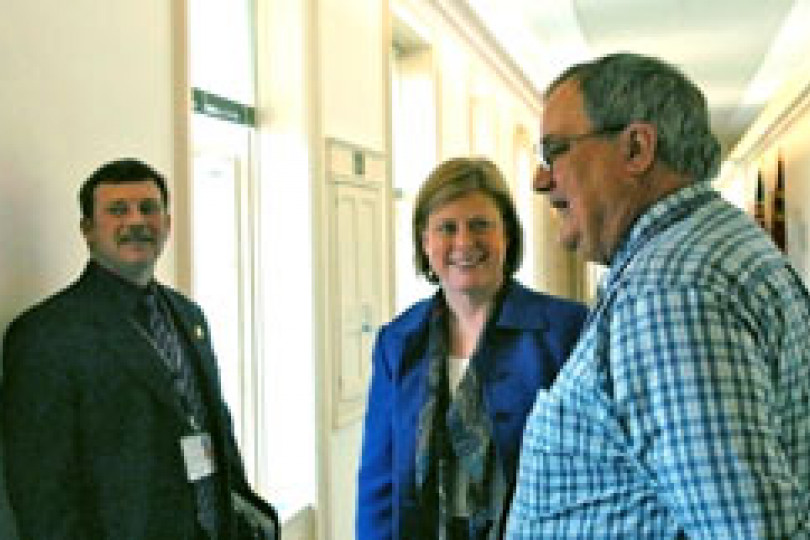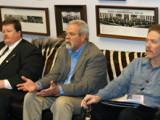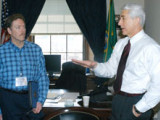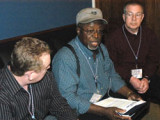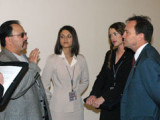Local D93’s Keith Gurwell (r.), and Local 83’s John Seward share some final thoughts with Rep. Nancy Boyda (D-KS 2nd) outside the congresswoman’s office.
View Photo Gallery (6 photos)
Some delegates visit a dozen or more congressmen
IN THE BUSTLING U.S. House and Senate office buildings, more than 100 Boilermakers — some alone, but most in groups of three or four — hurry to their appointments with congressmen as part of the 2007 Legislative Education Action Program (LEAP) conference.
Some of the delegates are first timers, others are old hands. It is important work, and Boilermakers take it seriously. Before the meetings, delegates study talking points selected by the government affairs department. These are issues considered to be vital to the welfare of the Boilermakers union and its members. This year, the delegates focus on the Employee Free Choice Act, climate change legislation, U.S. shipbuilding, and fair trade. When meeting with congressmen, delegates explain why these issues are important to Boilermakers and attempt to build support.
Boyda meeting shows hectic pace
CONGRESSMEN OFTEN WORK under incredibly tight schedules, shuttling between their offices and the Capitol. In the office of first-term congresswoman Nancy Boyda (D-KS 2nd), three delegates await her return from a House vote: Ron Carlburg and Keith Gurwell, the president and recording secretary of D93 (Humboldt, Kan.) and John Seward, a business representative with Local 83 (Kansas City, Mo.).
Rep. Boyda arrives nearly out of breath and ducks into a nearby room. She returns munching a granola bar, and offers a snack to the delegation.
“We want to thank you for voting in favor of the Employee Free Choice Act,” Gurwell tells the congresswoman,” as the delegates begin working through each talking point.
“I cosponsored that bill,” Boyda proudly replies.
Seward then addresses environmental issues and explains that new technology means cleaner burning coal and good paying jobs, not only by building new plants and doing retrofits, but by manufacturing boilers and components as well.
The delegates hit all of their points before thanking Boyda again and heading off to their next meeting. It is not uncommon for delegates to meet with a dozen congressmen or more.
“I got really reamed out...”
THE TRAPPINGS OF congressional seniority are apparent in the office of 18-term Rep. Don Young (R-AK at-large). Young’s accommodations include a spacious main office adorned with trophy mounts of deer, elk, and antelope, along with a wolf skin rug and native Alaskan art. Delegates from Local 502 (Tacoma, Wash.) — BM-ST Randy Robbins, President Bruce Burge, and LEAP chairman Richard Jones — discuss issues with an aide while waiting for Young to return from the Capitol. Jones’ wife, Cheryl, also sits in.
After a few minutes, Young appears and shakes hands with the delegates before taking a seat behind his desk. He is a large, gruff politician who gets down to business quickly. Robbins thanks the congressman for his vote on the Employee Free Choice Act. “I got really reamed out for that one, buddy!” Young replies, reminding the delegation that he was one of only 13 Republicans who supported the bill.
Young has taken labor’s side on other issues, too, voting against NAFTA and CAFTA. Listening intently as Burge discusses recent attacks on the Jones Act (which protects American shipbuilding), Young suddenly turns to his aide. “We will write a letter inquiring what the hell is going on!” he says. “I’m one of the strongest supporters of the Jones Act.”
While Young has been an important ally on many key Boilermaker issues, the topic of global climate change instantly raises his hackles. He launches into a discussion about historical glacial change and oil formation, making it clear that this is one area where he will take an opposing position.
Congressman races to vote
THE WASHINGTON STATE delegation crowds into the office of Rep. Dave Reichert (R-WA 8th). The contingent includes Local 502 (Tacoma), Local 104 (Seattle), and Local 290 (Bremerton).
Reichert returns after voting in the House but is quickly called back for another vote. Although he doesn’t have much time, Reichert stays to speak with the delegates. The minutes tick down rapidly as the Boilermakers make their points.
“This [the Jones Act] is one that we can make a phone call on,” Reichert says. “We’ll do something right away.”
One of Reichert’s aides returns every two minutes to report on how much time is left on the House vote. Finally, Reichert excuses himself and dashes down the hall on his way to the Capitol.
“We want no part of Colombia.”
In the office of first-term congressman, Phil Hare (D-IL 17th) a contingent from Illinois meets with Amanda Perez, senior legislative assistant for the congressman. The delegates include: from Local 483 (Alton), Joe Brice, a retiree; from Local 158 (Peoria), Kevin Reatherford, secretary-treasurer, and Randall Ericson, a trustee; and from Local 60 (Peoria), Matt Nelson, e-board chairman, and Matt’s father, Mark, a Boilermaker retiree.
Reatherford and Perez talk abut the Employee Free Choice Act. “I know the Congressman is a big supporter,” Perez says. “He worked very hard on it.”
Brice presses Perez on the issue of fair trade, stating: “They have a negotiating team in Colombia. We don’t want any part of trade with Colombia. If you have someone there trying to stand up for his rights…they send him home in a box.” Colombia is notorious for murdering unionists.
Perez responds that Hare and other freshman Democrats are appealing to Rep. Charlie Rangel (D-NY), chairman of the Ways and Means Committee, to be involved in crafting a new trade model that will protect the rights of workers, both in the U.S. and abroad.
Boilermaker daughters lobby, too
As Gary Fernandez, a dispatcher for Local 101 (Denver), goes on his lobbying trips, he brings along some extra help: daughters, Amanda, 18; and Shannon, 16. One of their stops is the office of Rep. Ed Perlmutter (D-CO 7th), who is serving his first term in Congress.
However, Perlmutter is not in his office. He is in the next building, attending a Financial Services Committee meeting. Amazingly, Perlmutter’s legislative assistant, Alec Garnett, offers to escort the Fernandez family to where the congressman is meeting. After a brisk walk, the aide enters a meeting room and returns with Rep. Perlmutter. Standing in the busy hallway, Gary Fernandez and his two daughters get Perlmutter’s full attention. It is a lesson in civics that the young Fernandez ladies will probably long remember.
Scrubber work is good for economy
In the office of Rep. Candice Miller (R-MI 10th), a delegation from Local 169 (Detroit) talks with one of Miller’s aides, Sean Moran, about trade issues while waiting for the congresswoman to return from the Capitol. “Michigan is getting killed on these trade agreements,” Moran acknowledges.
The Local 169 contingent couldn’t agree more. It includes President Mike Card; business agents Jim Kaffenberger and Bob Hutsell; and PAC committee member Bill Wibby. Miller soon returns to her office, and the discussion turns to climate change.
“I’ve just been appointed to the Select Committee on Energy Independence and Global Warming,” says Miller. This committee was announced March 9 by Speaker of the House Nancy Pelosi in response to growing concerns about climate change. Miller is one of six Republicans and nine Democrats on the committee.
Bob Hutsell tells Miller that cleaning up industrial pollutants is not only good for the environment, it’s good for the economy. “We’ve been installing scrubbers. My [Boilermaker] son has been staying in a hotel for five months. That scrubber work helps the hotels, the restaurants, the clothing stores…a lot of the economy. And there are ironworkers and other trades doing related work on environmental upgrades as well. That all contributes to the local economy.”
Lobbying continues on
THE GREATEST BENEFIT for a delegate at the LEAP conference is the ability to meet face-to-face with their congressmen. Members learn about how things work on Capitol Hill and take part in the process of government.
But the process doesn’t end with visits to congressmen. The government affairs department encourages all local lodges to stay in touch with their legislators throughout the year by fax, phone, or email. Effective lobbying is not a one-shot deal. It means following up, thanking congressmen for their time, staying on top of key Boilermaker issues, and if possible, connecting with congressmen in such a way that they remember who you are and what is important to you.
